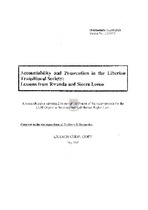| dc.contributor.advisor | Fernandez, L | |
| dc.contributor.author | Gassama, Diakhoumba | |
| dc.contributor.other | | |
| dc.contributor.other | Faculty of Law | |
| dc.date.accessioned | 2013-08-07T13:48:28Z | |
| dc.date.available | 2007/05/29 07:32 | |
| dc.date.available | 2007/07/20 | |
| dc.date.available | 2013-08-07T13:48:28Z | |
| dc.date.issued | 2005 | |
| dc.identifier.uri | http://hdl.handle.net/11394/1858 | |
| dc.description | Magister Legum | en_US |
| dc.description.abstract | In the aftermath of World War Two, the International Community has shown a renewed commitment towards the protection of human rights. However, whether during wars or under dictatorial regimes, numerous human rights abuses occurred everywhere in the world, from Latin America to Eastern Europe and from Southern Europe to Africa. Countries which experienced oppressive governance or outrageous atrocities has to address the legacies of their past on the return of democratic rule or peace. In other words, they had to emerge from the darkness of dictatorship or civil war in order to establish a democracy. Today, after 14 years of civil war, Liberia is faced with the challenge of achieving a successful transition where the imperatives of truth, justice and reconciliation need to be met. The purpose of this research paper was to make some recommendations on the way the accountability process in Liberia should be shaped as far as prosecution is concerned. | en_US |
| dc.language.iso | en | en_US |
| dc.publisher | University of the Western Cape | en_US |
| dc.subject | War crime trials - Liberia | en_US |
| dc.subject | International criminal courts | en_US |
| dc.subject | Crimes against humanity - Liberia | en_US |
| dc.title | Accountability and prosecution in the Liberian transitional society: lessons from Rwanda and Sierra Leone | en_US |
| dc.type | Thesis | en_US |
| dc.rights.holder | University of the Western Cape | en_US |
| dc.description.country | South Africa | |

